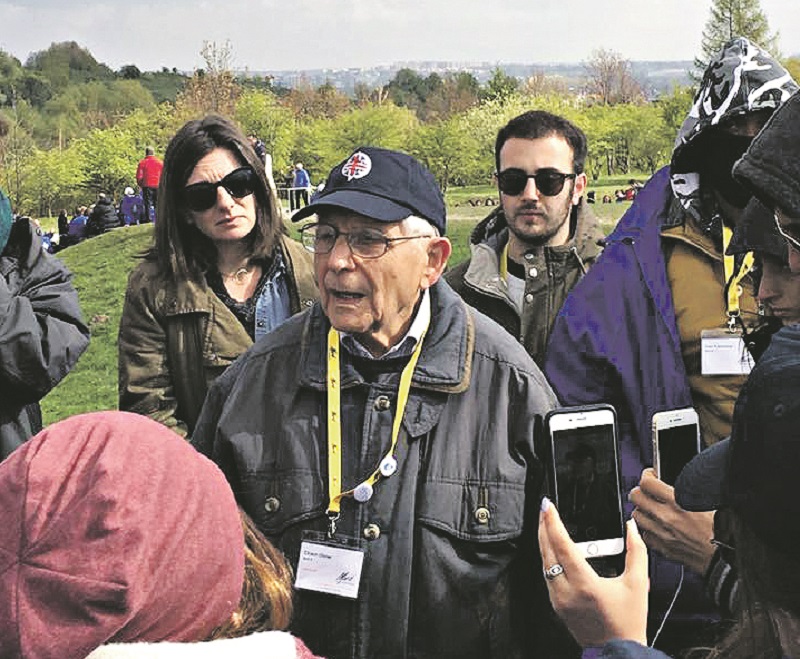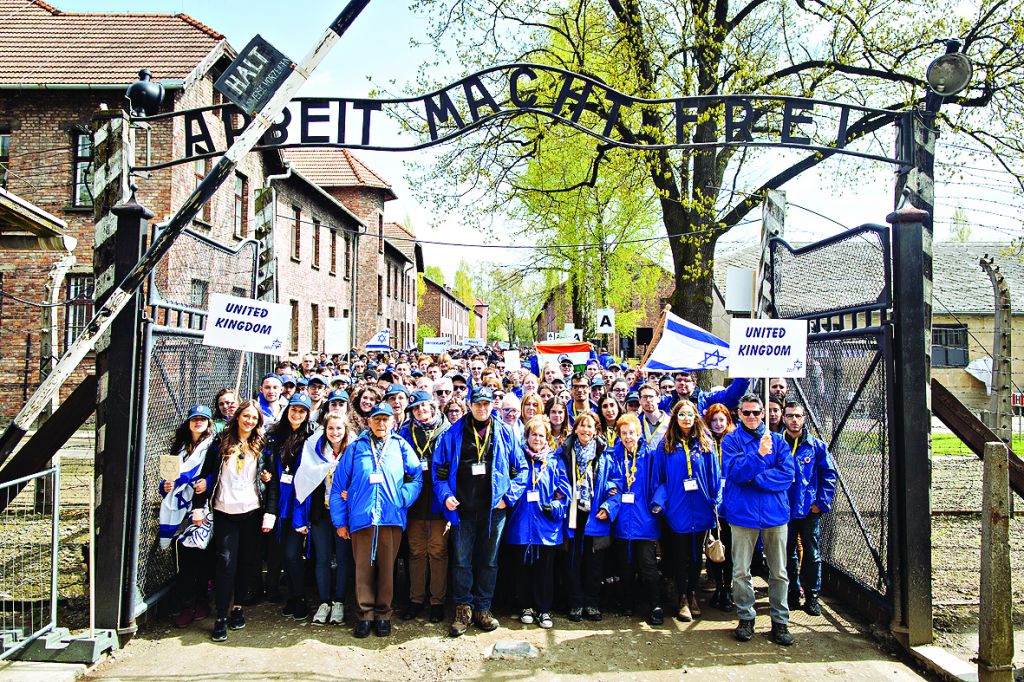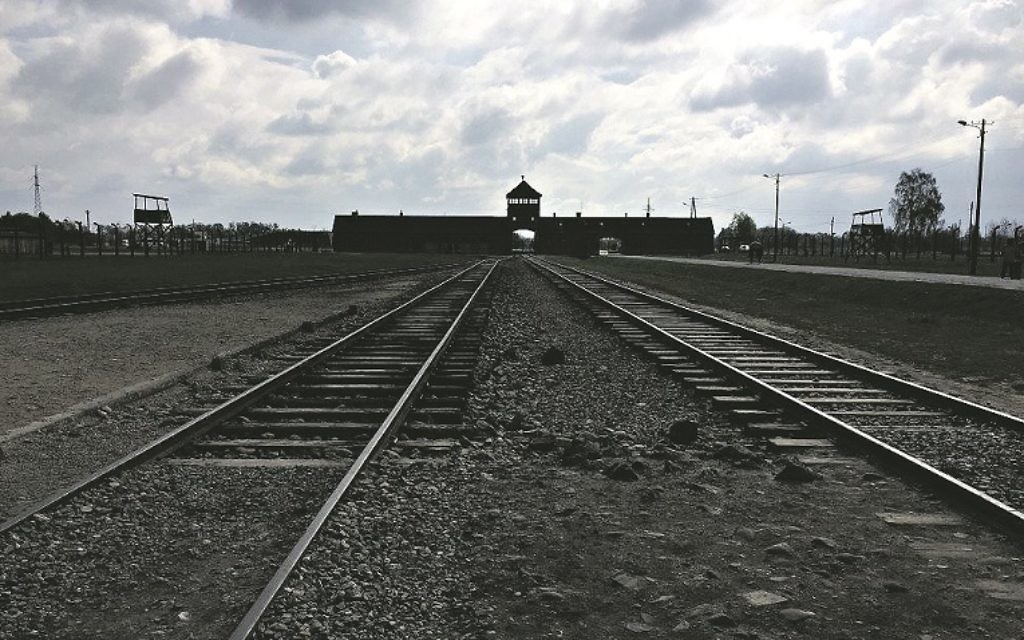A land of tragedy – and revival
Jack Mendel gets in touch with his Jewish roots on an emotional visit to Poland
The first time I visited Poland – or indeed eastern Europe, the birthplace of my ancestors – was to witness the opening of a museum celebrating the thousand-year history of the country’s Jewish community.
That of course includes their rich cultural contribution to Poland, as well as the community’s tragic decimation in the wake of the Holocaust.
The systematic mass murder of Jews by Nazis during the Second World War resulted in the deaths of approximately 90 percent of the country’s 3.3 million Jews.
Get The Jewish News Daily Edition by email and never miss our top stories Free Sign Up
Time did not allow for me to visit one of the former Nazi death camps located in Poland, which include Majdanek, Chelmno, Sobibor, Treblinka, Belzec and notably, Auschwitz, where some 1.1million Jews were deported.
But then I returned again to Poland as a participant on March of the Living, to delve deeper into the country’s Jewish roots and to understand more about this modern day tragedy.
When I think of Poland, it’s difficult to separate it from its indomitable Jewish past.
Arriving on a chilly spring day in April, I was greeted by Warsaw’s grey and dull bloc buildings. The city can be a little depressing, having been bombed in the war, and rebuilt with a cold war-style Soviet influence.
Perhaps it isn’t to everyone’s taste, but there is a certain simplistic charm which grew on me.
Warsaw’s Jewish past is woven into every element. Boasting a Jewish presence since the 14th century, Poland’s capital was the epicenter of cultural life before the Holocaust, so it’s very much defined by what was lost.

I walked along the street and saw plaques and monuments telling me about heroes of the Warsaw Ghetto uprising.
The Umschlagplatz, an area used by the Nazis to assemble and deport Jewish victims, sits between blocks of modern flats, and opposite is the former Nazi SS headquarters, which is plastered with posters and graffiti.
While remnants of a disquieting past were all around us, Warsaw Jewish Community Centre – as well as the one in Krakow – are signs of Jewish rebuilding and revival of in Poland.
Anyone could come in, and everyone was welcomed. Every year, more Poles discover previously unknown Jewish roots, and they literally do walk in to find out more.
While Warsaw is notable as the capital, for me Krakow has more soul. Used as the Nazi headquarters in Poland during the war, the city remained largely intact, including its grand, historic synagogues. In the Jewish district of Kazimierz, seven such synagogues still stand.
While the community is not what it once was, Krakow’s Izaak Synagogue was gratifyingly brought back to life as hundreds of march participants filed in for a pre-Shabbat service, leaving standing room only.
Just south of the city lies the remnants of Płaszów camp, populated by the liquidated Krakow ghetto and where 9,000 prisoners lost their lives.

I had the honour of visiting there with survivor, Chaim Olmer. We also travelled to Majdanek, before making our way to Auschwitz.
My experience at Auschwitz-Birkenau was hard to process at the time. During the trip, I first visited Auschwitz with a small group of around 35 people, and then returned, but this time with more than 11,000, for the march itself.
On my first visit, it was empty, quiet, and grey. All I could see were barracks. As the rain came down and the biting wind lashed my face, all we could think about was what it must have been like to endure life here, and what could have been done to prevent all the suffering that took place on this land. It was something I found difficult to comprehend.
When we returned for the march, beginning at Auschwitz I and ending one-and-a-half miles along at Birkenau, thousands of people were in attendance.

People waved flags, exchanged badges from around the world, and sang Jewish songs. Along the route, Christian and Polish groups lined the streets, in support of the marchers. In many ways it was surreal. I was surrounded by the joy that we were alive, while acknowledging that we were marching in a place where so many perished.
While a part of that did not feel right, the message was also empowering.
The community may have been close to being extinguished, but Polish-Jewry will never be forgotten.
Holocaust Memorial Day is marked this Saturday, 27 January. Jack was a participant on March of the Living, which this year takes place from 8 to 13 April. For more details, visit marchoftheliving.org.uk

Thank you for helping to make Jewish News the leading source of news and opinion for the UK Jewish community. Today we're asking for your invaluable help to continue putting our community first in everything we do.
For as little as £5 a month you can help sustain the vital work we do in celebrating and standing up for Jewish life in Britain.
Jewish News holds our community together and keeps us connected. Like a synagogue, it’s where people turn to feel part of something bigger. It also proudly shows the rest of Britain the vibrancy and rich culture of modern Jewish life.
You can make a quick and easy one-off or monthly contribution of £5, £10, £20 or any other sum you’re comfortable with.
100% of your donation will help us continue celebrating our community, in all its dynamic diversity...
Engaging
Being a community platform means so much more than producing a newspaper and website. One of our proudest roles is media partnering with our invaluable charities to amplify the outstanding work they do to help us all.
Celebrating
There’s no shortage of oys in the world but Jewish News takes every opportunity to celebrate the joys too, through projects like Night of Heroes, 40 Under 40 and other compelling countdowns that make the community kvell with pride.
Pioneering
In the first collaboration between media outlets from different faiths, Jewish News worked with British Muslim TV and Church Times to produce a list of young activists leading the way on interfaith understanding.
Campaigning
Royal Mail issued a stamp honouring Holocaust hero Sir Nicholas Winton after a Jewish News campaign attracted more than 100,000 backers. Jewish Newsalso produces special editions of the paper highlighting pressing issues including mental health and Holocaust remembrance.
Easy access
In an age when news is readily accessible, Jewish News provides high-quality content free online and offline, removing any financial barriers to connecting people.
Voice of our community to wider society
The Jewish News team regularly appears on TV, radio and on the pages of the national press to comment on stories about the Jewish community. Easy access to the paper on the streets of London also means Jewish News provides an invaluable window into the community for the country at large.
We hope you agree all this is worth preserving.
-
By Brigit Grant
-
By Laurent Vaughan - Senior Associate (Bishop & Sewell Solicitors)
-
By Laurent Vaughan - Senior Associate (Bishop & Sewell Solicitors)
-
By Laurent Vaughan - Senior Associate (Bishop & Sewell Solicitors)
-
By Laurent Vaughan - Senior Associate (Bishop & Sewell Solicitors)






















